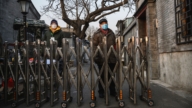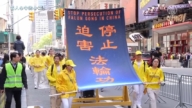【新唐人2013年07月08日訊】長期以來,中共的政法系統對民眾的暴力「維穩」,造成社會民怨沸騰,也讓中共政權危機四伏。日前,廣東省高級人民法院院長對外表示,絕大多數司法不公是因為「司法不獨立、司法行政化」。那麼我們就來看看,這「司法行政化」的背後到底是甚麼?
中共總書記習近平上臺後,曾一再表示要反對執法不公、嚴懲司法腐敗。隨後,政法系統出現地震,各地政法官員紛紛落馬或者自殺。但大陸司法黑暗並沒有因此改觀,訪民、異見人士仍然被隨意抓捕判刑,普通民眾的正常權利根本沒有保障,而特權階層依然逍遙於法律制裁之外。
大陸媒體《中國新聞週刊》最近報導,廣東法院系統正在推行一系列所謂「去行政化」的改革措施。其中深圳福田區法院、佛山中院開始試行審判長負責制,希望藉此來排除行政權力對審判的干擾。
報導援引廣東省高級人民法院院長鄭鄂的話說,司法改革重心必須轉向體制改革,這迫切要求頂層設計。他表示,絕大多數司法不公並不是因為司法腐敗,而是司法行政化。
對此,中國法律專家、北京市律師協會「憲法人權委員會」委員楊學林,向《新唐人》分析指出,司法腐敗肯定是司法不公的一個原因,但是司法腐敗的根源還是體制問題。
中國法律專家 楊學林:「就是司法不獨立、法官不獨立,受到的這種行政干預太多。它必然會導致司法腐敗。其實就這麼簡單。」
據了解,「去行政化」改革並不是一個新的觀點。多年前,中國法律界人士已經對此達成共識,併進行了持續不斷的呼籲。但改革的困難點在於﹕在中國社會現有體制下,黨委、政府干預案子的現象十分普遍。
大陸南京「東南大學」法學教授 張讚寧:「最主要的機制就是:憲法上有一句話『中國共產黨領導』。而且專門成立了一個『政法委』,來領導公檢法的工作、審判工作,這是造成司法不獨立的一個根本原因。」
大陸南京「東南大學」法學教授張讚寧談到,中國大陸的法官人事晉升、和法院的財政等方方面面,都受地方政府和當局控制,所以法官們根本不可能依法審判,而是根據後臺的需要、與政治需要審判,這必然造成有法不依。
張讚寧認為,在中國,無法兌現司法獨立與司法公正最主要的困難點,還是在於一黨專政。
而「中國公民監政會」發起人郭永豐也談到,中共自身不可能進行根本的司法改革,因為這等於是向腐敗的官場開刀、等於是自殺。郭永豐說,中共在自身體制內的所謂改革,本質上都是治標不治本的愚民政策。
中國公民監政會發起人 郭永豐:「治標不治本,總是做一些花樣來玩一玩,來愚弄、欺騙一下老百姓。那個改革有甚麼意義呀?沒意義的。司法獨立、新聞自由、言論自由,包括開放報禁、黨禁、民間可以自由組黨,這些它敢改嗎?不敢。」
在今年3月的中共全國「兩會」上,最高人民法院的工作報告,獲得605張反對票、120張棄權票,創下5年來不信任票的最高記錄,凸顯中共司法制度的尷尬處境。
採訪/易如 編輯/李謙 後製/周天
What’s at the Bottom of CCP’s Administration of Justice
The Chinese Communist Party’s (CCP) politics and law system
has been “maintaining social stability” through violence.
It has caused boiling resentment among the people.
It has also caused the CCP regime to be threatened
by a growing crisis.
Recently, the Chief Judge of Guangdong senior court stated
that judicial injustice is caused by “judicial non-independence
and administration of justice.”
Let’s take a look at what’s behind this
“administration of justice.”
Since Xi Jinping took the office, he discussed eradicating
denials of justice and penalizing judicial corruption over and over.
Later on, a personnel earthquake took place in
the CCP’s politics and law system.
Politics and law officials across the country fell
or committed suicide.
Nevertheless, the dark side of the CCP’s judicial system
has never changed.
Petitioners and activists are still randomly arrested
and sentenced.
Basic rights of ordinary people cannot be guaranteed.
The privileged groups are still abusing their power
above the law.
Recently, China’s media, China News Weekly, reported that
the justice system in Guangdong is promoting a series
of reforms, called eliminating justice of administration.
Futian Court in Shenzhen and Foshan Court began
implementing the “chief judge being in full charge” system.
The report quoted Zheng E’s remark, chief judge
of Guangdong senior people’s court,
who said that judicial reform must direct to system reform.
It requires re-designing the top structure.
Zheng stated that most judicial injustices are caused
by administration of justice not by judiciary corruption.
Regarding this comment, Yang Xuelin Chinese legal expert
and member of human rights committee of the Constitution
and of the Bar Association in Beijing, stated that judicial
corruption is definitely one of the reasons for judicial injustice.
However, the root problem of judicial corruption
is the CCP’s system.
Yang Xuelin: “If both the judiciary and judges are not
independent,
and they both have too much administration interference,
judicial corruption is unavoidable. It is just this simple.”
Actually, “removal of the judiciary administration”
is not a new viewpoint at all.
Many years ago, legal professionals in China achieved
this consensus and have been calling for it.
However, what’s challenging is that the government has
been intervening in cases all the time in the current regime system.
Zhang Zanning, Law Professor of Southeastern University:
“In the CCP’s constitution, there is a sentence which says,
“China is led by the Chinese Communist Party."
Specifically, the politics and law committee has been
established to supervise the public security system.
This is one of the root reasons why judicial injustice
takes place.”
Zhang Zanning mentioned that in China judges’ promotion
and courts’ financials are all controlled by the local government and senior authorities.
Therefore, it’s impossible for judges to make
judgments according to the law.
Thus, it is inevitable that the law is not abided by.
Zhang Zanning stated that one party monopoly is the root
reason why judicial independence and judicial justice cannot be realized.
Guo Yongfeng, founder of Chinese Citizen Policies Monitoring
Committee, also said that it’s impossible that the party itself can execute any judicial reform.
If it does, the party is committing suicide.
The so-called reforms in the CCP’s internal system
are for nothing other than to fool people.
Guo Yongfeng: ”What’s the point of reform
if it’s only to play some tricks and fool ordinary people? It’s meaningless.
Does the party dare to stop screening news and allow
the construction of other parties in China,
thus to realize judiciary independence, press freedom
and expression freedom? No, it doesn’t.”
This March, during the CCP’s two national congresses,
the work report from Supreme People’s Court got 605 dissenting votes and 120 abstaining votes.
People’s distrust in the judicial system reached
a record high in the past 5 years,
which manifested the embarrassing situation of
the CCP’s judicial system.


























